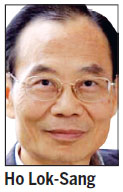An open letter to Hong Kong's younger generation
Updated: 2014-12-09 07:21
By Ho Lok-Sang(HK Edition)
|
|||||||||
In 2003, the then Lingnan Institute of Humanities and Social Sciences (now defunct) organized a three-day conference on "Growing Up in Hong Kong in the 21st Century". This was co-organized with the Hong Kong Federation of Youth, Centre for Social Policy Studies of the Hong Kong Polytechnic University, Youth Outreach, and RTHK. It lasted for three days and was the biggest conference I have ever organized. I had always thought our young people were facing significant challenges and the conference, well attended with over 200 participants, reflected how important and timely the issue was.
This is what I wrote in the foreword of the book published as a sequel to the conference: "Following the end of the British Rule, Hong Kong - the unique Special Administrative Region of the People's Republic of China, stepped formally into the era of the 'One Country Two Systems, Hong Kong People Ruling over Hong Kong, and a High Degree of Autonomy' experiment. With the extension of education to all school-age children, the popularization of democratic thoughts, young people are facing a vast gap between the reality and the ideal world....."
Ending the foreword, I wrote: "Young people share the same blood as the older generation. How can they become worse (less capable or less resilient and so on) than their predecessors? The often-repeated remark that young people only get worse from one generation to another is unscientific. Our young people grew up in a world shaped by adults and on soil cultivated by the older generation. If they do get worse, this only reflects the inadequacies of the older generation. Of course, we should tell them that they are responsible for their lives and their future, but the older generation similarly must be responsible for their lives and the errors they have made."

The conference volume was published in 2005, but the central message is as relevant today as it ever was. If our young people are misguided, certainly their parents and teachers are partly responsible for misdirecting them. If they lack the ability to think critically, and are confused about the difference between genuine democracy and genuine universal suffrage, certainly their parents and teachers, and our legislators, and commentators, have not done their jobs well.
My point is that it is time for both young and old to end the blame game. If we want Hong Kong to have a bright future we really need to work together. Instead of trying to find people to blame, it is far better to work together to do things better from now on.
One of the key aspects of achieving wisdom is learning from past mistakes and remembering that we are all fallible. If we want to build a better Hong Kong we need to put aside all our prior beliefs, and work out the best strategy for everyone. This should always be within a solid legal framework. The best strategy must be the most effective one. The best strategy is not the "best strategy based on prior beliefs". Similarly, a better world is not the "better world based on prior beliefs." By prior beliefs, I mean things that we hold to be true without questioning them - without thinking critically about them.
The occupiers, and particularly the Hong Kong Federation of Students (HKFS) and Scholarism, believe "Occupy" was the best strategy for achieving their "democratic" dream. However, in what sense is it the best strategy? It has not achieved anything beyond making people suffer. Blaming the government for not agreeing to their demands does not help their cause. "Occupy" is only the best strategy when it is based on prior beliefs.
The occupiers believe "genuine universal suffrage" means "public nomination" and public nomination will bring about a better world. But why will it bring about a better world? Is there any real evidence that countries which have public nomination can somehow provide better livelihoods than those which don't? Neither the HKFS nor Scholarism can explain why "genuine universal suffrage" in the sense of public nomination will bring about a better world. This is because their faith in "genuine universal suffrage" is based on prior beliefs.
Unfortunately many adults are reinforcing these old, outdated beliefs in the minds of our young people. The SAR government over the past decade has undertaken various new initiatives to help young people get a better education, start new businesses, or train them for better careers.
We must not forget that a truly democratic government is one that responds to, and does its best to satisfy, people's genuine needs. We should all work together toward this end.
The author is director of the Centre for Public Policy Studies at Lingnan University.
(HK Edition 12/09/2014 page1)